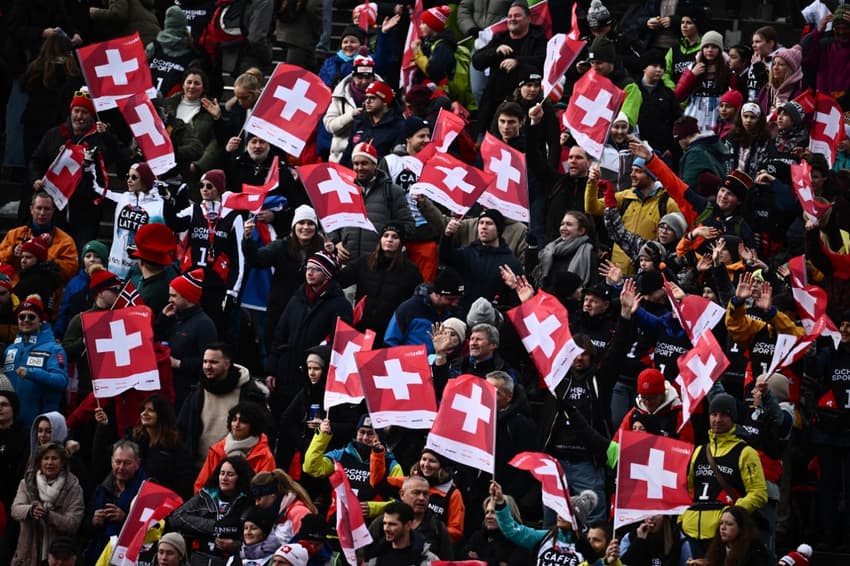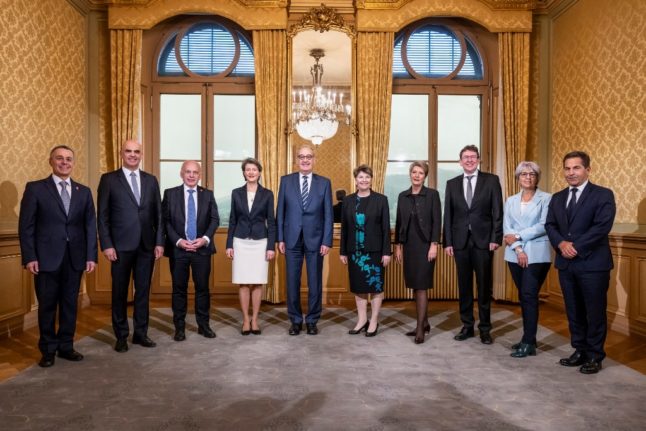EXPLAINED: Who is in charge of running Switzerland?

Unlike other countries in Europe and elsewhere that are governed by presidents, prime ministers, monarchs, or dictators, Switzerland has a unique system of its own.
If you are confused about who exactly is running Switzerland, you are not alone.
Many people living abroad may find it hard to believe that this country has no one single leader — just as it doesn’t have one single language either.
It’s true that when it comes to political leadership, Switzerland is an anomaly of sorts, though certainly not in a negative sense. In fact, it may well be the only industrialised nation in the world where all the political power lies at the grassroots level — with the citizens.
READ MORE: A foreigner's guide to understanding Swiss politics in five minutes
Swiss political system in a nutshell
Before we get to the main differences, let’s look at similarities between Switzerland’s government and those of many other countries.
One major similarity is that the government is divided between three branches: the legislature (parliament), which passes the laws; the executive (the Federal Council), which implements laws; and the judiciary (courts), which interprets them.
So far it sounds simple enough.
However, unlike other countries, where political decisions are made at the top and then trickle down to be followed by the population, in Switzerland it is the other way around.
Think of the Swiss system as an inverted pyramid: people, the main policy makers rather than mere recipients of decisions passed down from the upper echelons, are at the top.
This is how it works.
In other nations, the elected officials make decisions on behalf of their constituents. But in Switzerland, a centuries-old tradition of direct democracy gives people — rather than lawmakers — the power to shape local and national policies.
READ MORE: How Switzerland’s direct democracy system works
No legislation can be enacted here until citizens approve it in a referendum. In this way, they can have a say in a political process that impacts their lives.
In concrete terms, the parliament makes laws, but they won’t be enacted until the voters have their say. This is were referendums come in.
There are two types: a mandatory and optional referendum.

Referendums are a backbone of Switzerland's political system.Photo by Fabrice COFFRINI / AFP
The first one is held when legislation and constitutional amendments approved by the parliament must be accepted (or rejected) by the voters. If the legislation is approved, it is implemented. If it is turned down, it doesn't become law.
The second type allows any group or individual to contest an existing law, by gathering 50,000 signatures within 100 days. The petition must include names and addresses of Swiss citizens only.
Then there are popular, citizen-driven initiatives, which don’t challenge existing laws but are intended to create new ones.
An initiative must be launched by at least seven citizens and be backed by 100,000 signatures collected within 18 months in order to push it to a national vote.
For cantonal or communal initiatives, fewer signatures are required, based on the population of a given canton or municipality.
And citizens have plenty of opportunities to challenge legislation or create new one: referendums are held an average of four times a year.
READ MORE: How ordinary citizens can try to change the law in Switzerland
Here is an example.
In 2020, Swiss People’s Party (SVP) gathered enough signatures to bring an anti-immigration initiative to the ballot box.
It called on the government to curb the influx of immigrants from the EU by rescinding the Free Movement of Persons agreement between Bern and Brussels.
The Federal Council urged the voters to reject this proposal, arguing that this move would jeopardise Switzerland’s economic prosperity and its other treaties with the European Union — Switzerland’s main trading partner.
The voters sided with the government on this issue and rejected the initiative.
Had the proposal been accepted, a new law, restricting the access of EU workers to the Swiss labour market, would have to be implemented.
Does Switzerland have a president?
Yes, but there is a... but.
So that nobody gets too comfortable in this position (as is the case in some other countries), presidents in Switzerland serve only one year.
They are elected from among the seven cabinet members, that is, the Federal Council.
Each autumn MPs in in both chambers of the parliament (Council of States and National Council) elect the president for the following year. This is mostly ceremonial, since everyone knows ahead of time who is in line for the rotating presidency in a given year.
No surprises there.
Once elected, however, the president is not the head of state. Probably because seven heads are believed to be better than one, the entire Federal Council acts as the collective head of state. So it would not be wrong to say that Switzerland is a country with seven heads.

The seven members of Federal Council. Federal Chancellor Walter Thurnherr (right) is also on the photo.Photo by ALESSANDRO DELLA VALLE / AFP
So what does the president actually do?
According to the government site, “he or she chairs the Federal Council meetings and mediates in the case of disputes. In urgent situations the president can order precautionary measures. In the unlikely event that the Federal Council is unable to hold either an ordinary or an extraordinary meeting, the president may take a unilateral decision” — the latter being the only bit of ‘power’ the president can wield.
Other than that presidents have some special duties during their year of office, such as representing Switzerland on official visits abroad.
Traditionally, they also give a speech at New Year and on Swiss National Day on August 1st.
This notion may be difficult to grasp, but the entire Swiss system is based on the premise that all seven members of the Federal Council (who also act as ministers and heads of federal departments) are equal in status and nobody wields more power or has more clout than others.
The way the system is set up in Switzerland is that the only clout lies with the people, as they are the ones who ultimately make political decisions.
So now you know the unequivocal answer to the question of who is in charge in Switzerland: the citizens.
Comments
See Also
If you are confused about who exactly is running Switzerland, you are not alone.
Many people living abroad may find it hard to believe that this country has no one single leader — just as it doesn’t have one single language either.
It’s true that when it comes to political leadership, Switzerland is an anomaly of sorts, though certainly not in a negative sense. In fact, it may well be the only industrialised nation in the world where all the political power lies at the grassroots level — with the citizens.
READ MORE: A foreigner's guide to understanding Swiss politics in five minutes
Swiss political system in a nutshell
Before we get to the main differences, let’s look at similarities between Switzerland’s government and those of many other countries.
One major similarity is that the government is divided between three branches: the legislature (parliament), which passes the laws; the executive (the Federal Council), which implements laws; and the judiciary (courts), which interprets them.
So far it sounds simple enough.
However, unlike other countries, where political decisions are made at the top and then trickle down to be followed by the population, in Switzerland it is the other way around.
Think of the Swiss system as an inverted pyramid: people, the main policy makers rather than mere recipients of decisions passed down from the upper echelons, are at the top.
This is how it works.
In other nations, the elected officials make decisions on behalf of their constituents. But in Switzerland, a centuries-old tradition of direct democracy gives people — rather than lawmakers — the power to shape local and national policies.
READ MORE: How Switzerland’s direct democracy system works
No legislation can be enacted here until citizens approve it in a referendum. In this way, they can have a say in a political process that impacts their lives.
In concrete terms, the parliament makes laws, but they won’t be enacted until the voters have their say. This is were referendums come in.
There are two types: a mandatory and optional referendum.

The first one is held when legislation and constitutional amendments approved by the parliament must be accepted (or rejected) by the voters. If the legislation is approved, it is implemented. If it is turned down, it doesn't become law.
The second type allows any group or individual to contest an existing law, by gathering 50,000 signatures within 100 days. The petition must include names and addresses of Swiss citizens only.
Then there are popular, citizen-driven initiatives, which don’t challenge existing laws but are intended to create new ones.
An initiative must be launched by at least seven citizens and be backed by 100,000 signatures collected within 18 months in order to push it to a national vote.
For cantonal or communal initiatives, fewer signatures are required, based on the population of a given canton or municipality.
And citizens have plenty of opportunities to challenge legislation or create new one: referendums are held an average of four times a year.
READ MORE: How ordinary citizens can try to change the law in Switzerland
Here is an example.
In 2020, Swiss People’s Party (SVP) gathered enough signatures to bring an anti-immigration initiative to the ballot box.
It called on the government to curb the influx of immigrants from the EU by rescinding the Free Movement of Persons agreement between Bern and Brussels.
The Federal Council urged the voters to reject this proposal, arguing that this move would jeopardise Switzerland’s economic prosperity and its other treaties with the European Union — Switzerland’s main trading partner.
The voters sided with the government on this issue and rejected the initiative.
Had the proposal been accepted, a new law, restricting the access of EU workers to the Swiss labour market, would have to be implemented.
Does Switzerland have a president?
Yes, but there is a... but.
So that nobody gets too comfortable in this position (as is the case in some other countries), presidents in Switzerland serve only one year.
They are elected from among the seven cabinet members, that is, the Federal Council.
Each autumn MPs in in both chambers of the parliament (Council of States and National Council) elect the president for the following year. This is mostly ceremonial, since everyone knows ahead of time who is in line for the rotating presidency in a given year.
No surprises there.
Once elected, however, the president is not the head of state. Probably because seven heads are believed to be better than one, the entire Federal Council acts as the collective head of state. So it would not be wrong to say that Switzerland is a country with seven heads.

So what does the president actually do?
According to the government site, “he or she chairs the Federal Council meetings and mediates in the case of disputes. In urgent situations the president can order precautionary measures. In the unlikely event that the Federal Council is unable to hold either an ordinary or an extraordinary meeting, the president may take a unilateral decision” — the latter being the only bit of ‘power’ the president can wield.
Other than that presidents have some special duties during their year of office, such as representing Switzerland on official visits abroad.
Traditionally, they also give a speech at New Year and on Swiss National Day on August 1st.
This notion may be difficult to grasp, but the entire Swiss system is based on the premise that all seven members of the Federal Council (who also act as ministers and heads of federal departments) are equal in status and nobody wields more power or has more clout than others.
The way the system is set up in Switzerland is that the only clout lies with the people, as they are the ones who ultimately make political decisions.
So now you know the unequivocal answer to the question of who is in charge in Switzerland: the citizens.
Join the conversation in our comments section below. Share your own views and experience and if you have a question or suggestion for our journalists then email us at [email protected].
Please keep comments civil, constructive and on topic – and make sure to read our terms of use before getting involved.
Please log in here to leave a comment.